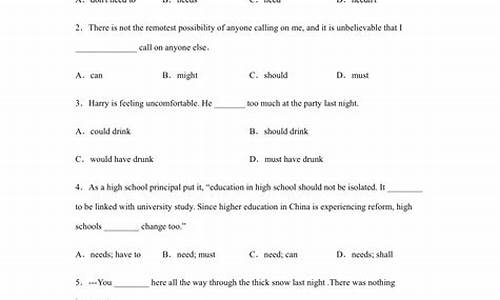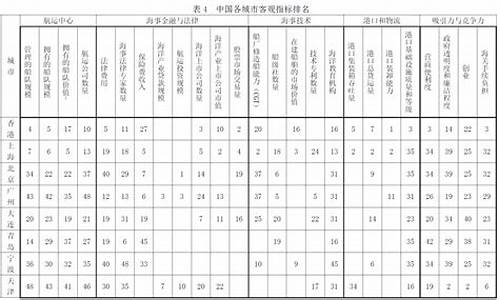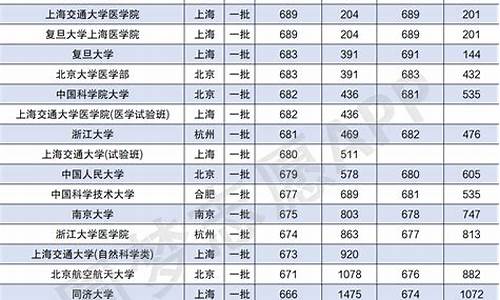您现在的位置是: 首页 > 教育资讯 教育资讯
情态动词 高考,高考情态动词练习
tamoadmin 2024-05-15 人已围观
简介1.解答高考英语试题。 情态动词+have done分类: 教育/科学 >> 外语学习 解析: will表推测,只能用于肯定句,“可能,该是” 的意思 请看相关知识辅导 历年高考试题对情态动词的考查热点有:1. 情态动词+do表对现在推测的用法。2. 情态动词+have+done 结构表过去推测或虚拟的用法。3. shall表命令、指示、意图、允诺;义务、规定的用法。4.
1.解答高考英语试题。 情态动词+have done

分类: 教育/科学 >> 外语学习
解析:
will表推测,只能用于肯定句,“可能,该是”
的意思
请看相关知识辅导
历年高考试题对情态动词的考查热点有:1. 情态动词+do表对现在推测的用法。2. 情态动词+have+done 结构表过去推测或虚拟的用法。3. shall表命令、指示、意图、允诺;义务、规定的用法。4. must 表主张或与说话人愿望相反及不耐烦。下面就结合历年高考试题对情态动词的常见考点进行总结与归纳。
1. 情态动词+do表对现在推测的用法。
1)肯定的推测可用must -will-would -ought to-should-may-might(语气逐渐减弱,可能性从大到小。)。e.g.
①It’s nearly seven o’clock.Jack ___ be here at any moment.(NMET 95) A.must B.need C.should D.can
[分析]答案C. 句意: 快七点了。Jack随时可能到来。should表可能性、推测或推论,“可能/该”。
②—Are you ing to Jeff’s party?
— I’m not sure. I ___go to the concert instead.(NMET 2000)
A. must B. would C. should D. might
[分析]答案D. 句意:--你会来参加Jeff的聚会吗?--说不准。我可能去听音乐会。 might 表可能性较小的推测,“可能/也许”。
③—Is John ing by train?
— He should, but he________not. He likes driving his car. (NMET2002)
A. must B. can C. need D. may
[分析]答案D. 句意:-- John将要坐火车来吗?--他可能乘火车,但也可能不。他喜欢开自己的车。must not表“不准”; can not表“不可能”;needn’t 表“不必”,表“可能不”。
2)否定的推测要用may not(口气较弱),can’t(口气较强),couldn’t(口气介于两者之间)。e.g. ①- Isn' t that Ann's hu *** and over there?
- No, it _______ be him -I'm sure he doesn't wear glasses. (NMET2004)
A. can't B. must not C. won't D. may not
[分析]答案A. 句意:--那边那个人不是Ann的丈夫吗?--不是,不可能是他—我肯定他是不戴眼镜的;can用于否定句表示怀疑和否定;must/will只能用于肯定句,表示有把握的推测。
②You ______ be tired - you've only been working for an hour. (NMET 2004)
A. must not B. won' t C. can' t D. may not
[分析] 答案 C. 句意:你不可能感到累--你才只干了一个小时。 can' t 表较有把握的否定推测,“不可能”; will表推测,只能用于肯定句,“可能,该是”;may not表不大有把握的否定推测,“可能不”; must not表禁止,“不准”。
3)疑问的推测一般只用can/could(可能性更小) 。
e.g. ①How____ you say that you really understand the whole story if you have covered only part of the article ? (2003年上海卷)
A.can B.must C.need D.may
[分析]答案A. 句意:如果你只看完了文章的部分内容,你怎么能够说真正地懂了整个故事呢?can用于疑问句表怀疑;must表义务、命令或必要;need 表必要;may表请求允许。
2. 情态动词+have+done 结构表过去推测或虚拟的用法。
1) can/could+ have done :“想必已/本来能”。can主要用于否定和疑问句;could不受限制,比can更委婉。
2) may/might+have done :“可能已”。疑问句中may要用can代;might不受限制,比may更委婉。
3) must+have done :“肯定已/谅必”。常用于肯定句。
4) should/ought to :“本应该/可能”。 不受限制。
5) would+have done :“本来要/会”。 不受限制。
6) dare not+have done :“本来不敢”。多用于否定句。
7) need not+have done:“本来不必”。 多用于否定句。
8) would rather+have done:“宁愿已/曾”。
e.g. ①I was really anxious about you. You__home without a word. (NMET2001)
A. mustn’t leave B. shouldn’t have left C. couldn’t have left D. needn’t leave
[分析]答案B。 句意:我真地为你而担忧。你本不该一言不发就离开家的。mustn’t leave和needn’t leave表禁止和不必,都指现在;shouldn’t have done作“本不应该”解;couldn’t have left表“本来不能”。
② —I’ll tell Mary about her new job tomorrow.
—You________ her last week. (2004年福建卷)
A.ought to tell B.would have told C.must tell D.should have told
[分析]答案D. 句意:--我明天将要告诉Mary有关她的新工作的事。--你本应该上周就告诉她的;ought to /must do表“应当/必须”,指现在或将来; would have done表“本来要/会“;should have done表示所期望的动作未完成,作“本应该”解。
③-Tom graduated from college at a very young age.
-Oh, he ______have been a very *** art boy then. (NMET2004)
A could B. should C. might D must
[分析]答案 D. 句意:- Tom年纪轻轻的就大学毕业了。-哦,他当时肯定是个很聪明的孩子。must have done是对过去的肯定推测;should have done表示所期望的动作未完成,作“本应该”解;could have done /might have done 表示“本来能够/可以”,都是可能性较小的推测。
3. shall表命令、指示、意图、允诺;义务、规定的用法。
1) shall用于第二、三人称的陈述句,表警告、命令、意图、允诺、决心等,“必须/应/可”。
2) shall在条约、规章、法令等文件中用于第三人称,表义务或规定,“应/必须”。
e.g. ①It has been announced that candidates ___remain in their seats until all the papers have been collected. (2002年上海卷)
A.can B. will C.may D.shall
[分析]答案D. 句意:已经宣布了试卷全部收回后应试者才可离开座位。shall表命令或指示;may/ can表允许;will表意愿。
②“The interest ________ be divided into five parts, according to the agreement made by both sides,” declared the judge. (2004年重庆卷)
A. may B. should C. must D. shall
[分析]答案D. 句意:法官宣布,“根据双方达成的协议,利息应分成五部分。”shall表义务或规定, “必须/应”; must和 should都表义务/责任 ,意为“应该/当”;may表允许。
③— Excuse me, but I want to use your puter to type a report.
— You ______ have my puter if you don't take care of it. (2004年湖南卷)
A.shan't B.might not C.needn't D. shouldn't
[分析]答案A。 句意:--对不起,我想用你的电脑打一篇报告。--如果你不把我的电脑照管好,你就不可以借。shan't=shall not. shall表说话者的意图、允诺、警告、命令、决心等;might not也表不可以,但语气过分委婉;needn't表不必;shouldn't表不该
4. must 表主张或与说话人愿望相反及不耐烦的用法。
1) must 表主张,“一定要/坚持要”。
2)must 表与说话人愿望相反及不耐烦,“偏要”。
e.g. ①— Who is the girl standing over there ?
— Well , if you ________ know , her name is Mabel . (2004年天津卷)
A. may B. can C. must D. shall
[分析]答案C。 句意:-站在那边的女孩是谁?-哦,如果你一定要知道的话,那我就告诉你她叫Mabel。may/can表允许,“可以”;must表主张,“一定/坚持要”;shall用在表意图、要求的从句中,有“应该/要”之意。
②John , look at the time . _____ you play the piano at such a late hour ?
A. Must B. Can C. May D. Need
[分析]答案A。 本题考查情态动词的用法。must 表是与说话人愿望相反或不耐烦,意思是“偏要”。
解答高考英语试题。 情态动词+have done
《高考英语总复习语法专项 情态动词》由留学英语组我整理(www.liuxue86.com)。本内容整理时间为05月12日,如有任何问题请联系我们。
高考英语总复习语法专项 情态动词
2009-03-18 11:48 来源:互联网 作者:佚名 [打印] [评论]
情态动词有一定的词义, 表示某种感情或语气, 是不完全动词, 不能单独作谓语, 需和实义动词一起构成谓语. 常见的情态动词有: can / could, may / might, must, shall / should, will / would, need, ought to, dare / dared等
一.may / might的用法:
1.表示?可以?, 即表示说话人许可或请求许可
a. You may take it away.
b. May I come in ?
2.表示?可能, 也许? (在疑问句中通常不用may / might, 而用likely, do you think, can等表示?是否可能, 会不会?的意思)
a. He may come today.
b. Is it likely to rain ?
c. Do you think the train will be late ?
d. Can the news be true ?这消息会是真的吗?
3.在提建议时, 可用May I
a. May I carry your bag ?
b. May I make a suggestion ?
二.can / could的用法:
1.表示许可或请求许可, 相当于may. 但can比may用得更广泛. can不仅表示说话人同意, 准许, 还可以表示客观条件许可. may通常只表示说话人同意或准许
a. The class is over. You can go home now.
b. You can go there tomorrow.
c. Can I borrow your car for today ?
2.在提建议时, 可用Can I / you
a. Can I buy you a drink ?
3.表示?会, 能?, 相当于be able to
a. He can speak English.
b. Can you play tennis ?
c. Little Tom can?t move the big box.
4.在疑问句中表示怀疑, 不确定或不会有的情况, 即?否定的推测?
a. Can it be true ? 这是真的吗?
b. Can it be true that he has passed the exam ? 他真的通过考试了吗?
5.can?t / couldn?t在陈述句中可表示?肯定不, 一定不?的意思
a. He can?t be in the room right now.
b. It can?t have rained last night, for the ground is dry.
6.can?t / couldn?t help doing sth表示?不得不,忍不住做某事?
a. People couldn?t help laughing at the foolish emperor.
7.can / be able to do的区别:
①.be able to可用于各种时态, 而can只有现在时can和过去时could
②.be able to可以和另一个不完全动词连用, 如should be able to (应该能够), must be able to (必须能够)等, 而can则不可以这样用
③.强调?能力?时, 多用be able to
a. The patient was soon able to sit up and read.
④.can可用于人或其他事物作主语的句子中; be able to只用于有生命的名词或代词作主语的句子中
三.must的用法:
1.表示?必须?, 它的否定形式是need not / needn?t, 而不是must not / mustn?t, mustn?t表示禁止或不许做某事
a. You must set off at once.
b. You needn?t tell John about it.
c. You mustn?t play with fire.
2.表示?肯定是, 一定是?的推测意义; 与此对应, 表示?肯定不,一定不?用can?t, 而不用mustn?t
a. You must be very tired now.
b. If he had really been there, I must have seen him.
c. He must have gone away. We don?t see him anywhere.
3.must / have to的区别:
①.must / have to一般可以通用, 但must侧重于说话人主观上的看法, 即?说话人认为必须?; have to侧重于客观上的需要, 含有?客观上不得不?之意
a. If the person is not breathing, you must try to start his breathing.
b. You must / have to study with a teacher if you want to know how to do first aid.
②.must没有时态的变化, 一般用于表示现在或将来; have to有时态的变化, 可用于过去, 现在, 将来各种时态
a. We must study hard when we are young.
b. I think she must remain in hospital for a week.
c. We had to stay there for a whole day because of the rain.
d. We have to practise a lot if we want to speak English well.
e. The situation has changed; we will have to change our plan.
③.它们的否定式mustn?t / not have to有很大的不同: mustn?t表示?不要(做某事)?, 有禁止之意; not have to表示?不必要(做某事)?, 含有?客观上无此必要?之意
a. You mustn?t move a person if he is badly hurt.
b. You don?t have to be a doctor to do first aid.
四.would的用法:
1.表示主观意志和愿望, 即?愿意,想要?
a. Come here whenever you would.
b. He would not leave before he finished his work.
2.would do sth可以表示过去经常发生的动作, 相当于used to do sth
a. When we were children we would go swimming every summer.
b. On Sundays he would go fishing for hours when he lived in the countryside.
3.表示请求, 愿望, 语气客气, 委婉
a. I would like some tea.
b. Would you mind closing the door ?
c. Would you tell me something about your trip ?
4.表示推测, 表示?大概, 也许?的意思
a. That would be the pen you are looking for.那也许是你在找的笔吧
五.should的用法:
1.表示义务, 责任, 可译为?应当?
a. We should complete the text in time.
b. You should be so careless.
2.表示推测或推论, 可译为?可能, 应该是?
a. He should be home by now, I think.
b. He should have arrived in Nanjing by this time.
3.should / ought to的区别:
should / ought to一般可以通用. should侧重于说话人主观上的看法, 有时含有劝告, 建议的口气, 即 ?按我的想法应该如何?; ought to语气更强, 强调?有责任, 有义务做某事?或者 ?按道理应该如何?
a. ?I will start the work at once. I think you should start at once.?
b. ?I will start the work tomorrow. No. You ought to start at once.?
六.need的用法: need表示?需要?, 既可作为情态动词, 也可作实义动词
1.need作实义动词时, 注意以下用法:
①.need to do sth; ②.need sb to do sth; ③.need doing sth (主动形式表被动意义)
a. You need to remain in bed.
b. I need you to help me with the housework.
c. The garden needs watering.( =The garden needs to be watered.)
2.need作情态动词时, 多用于否定句及疑问句中, 不用于肯定句中
a. It is still early. You needn?t hurry. =You don?t need to hurry.
b. It is 11 o?clock. Need I go now? =Do I need to go now ?
3.对于用need的提问, 肯定回答用must, 否定回答用needn?t
a. Need I come? Yes, you must. / No, you needn?t.
七.dare / dared的用法: 表示 ?敢?, 既可作为情态动词, 也可作为实义动词
1.作为情态动词时, 主要用于否定句和疑问句中, 不用于肯定句中
a. Little Jane dared not go alone. =Little Jane didn?t dare to go alone.
b. Dare you go out alone at night ? =Did you dare to go out alone at night ?
2.作为实义动词时, 可用于: dare to do sth
a. Little Jane didn?t dare to go alone.
b. Did you dare to go out alone at night ?
3.should / ought to的区别:
should / ought to一般可以通用. should侧重于说话人主观上的看法, 有时含有劝告, 建议的口气, 即 ?按我的想法应该如何?; ought to语气更强, 强调?有责任, 有义务做某事?或者 ?按道理应该如何?
a. ?I will start the work at once. I think you should start at once.?
b. ?I will start the work tomorrow. No. You ought to start at once.?
六.need的用法: need表示?需要?, 既可作为情态动词, 也可作实义动词
1.need作实义动词时, 注意以下用法:
①.need to do sth; ②.need sb to do sth; ③.need doing sth (主动形式表被动意义)
a. You need to remain in bed.
b. I need you to help me with the housework.
c. The garden needs watering.( =The garden needs to be watered.)
2.need作情态动词时, 多用于否定句及疑问句中, 不用于肯定句中
a. It is still early. You needn?t hurry. =You don?t need to hurry.
b. It is 11 o?clock. Need I go now? =Do I need to go now ?
3.对于用need的提问, 肯定回答用must, 否定回答用needn?t
a. Need I come? Yes, you must. / No, you needn?t.
七.dare / dared的用法: 表示 ?敢?, 既可作为情态动词, 也可作为实义动词
1.作为情态动词时, 主要用于否定句和疑问句中, 不用于肯定句中
a. Little Jane dared not go alone. =Little Jane didn?t dare to go alone.
b. Dare you go out alone at night ? =Did you dare to go out alone at night ?
2.作为实义动词时, 可用于: dare to do sth
a. Little Jane didn?t dare to go alone.
b. Did you dare to go out alone at night ? 《高考英语总复习语法专项 情态动词》由留学英语组我整理(www.liuxue86.com)
1. C 意译:昨天天气结果还算不错啊。我真是不需要带把雨伞呐,怪麻烦的。
后半句是虚拟语气。因为上句用了turned out,表示跟预计的情况不一样。天气预计不好,但其实还可以(没下雨)。所以下句说,本来不需要麻烦地戴上雨伞的。不需要 - needn't, 对过去时的虚拟,用have taken. 也就是说,说话人带了雨伞,虽然昨天没下雨。
A项是 应该带着; B项是本应该带着;D项是 一定不要带的
2. B. 意译:我们也许还未证明我们是了不起的探险家,但在过去十年间我们创下了从未有过的攀登旅行。(这里的march 有攀登、长途跋涉的意思,英文是hike, trek...)
此题只有B符合题意。
3. D 意译: 昨天你工作到很晚,今早你(其实)不需要来的 (含义是“你还是照常来了”)。
这个题和第一题一样是虚拟语气:你本来不需要来的。所以用了need(not) have done 的形式。
这三个题考点在情态动词的虚拟语气和对句意的理解。









